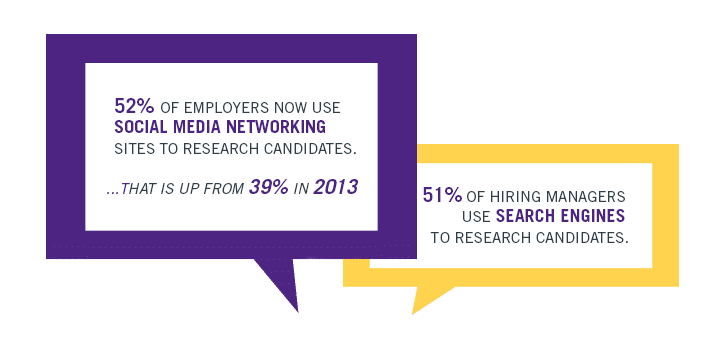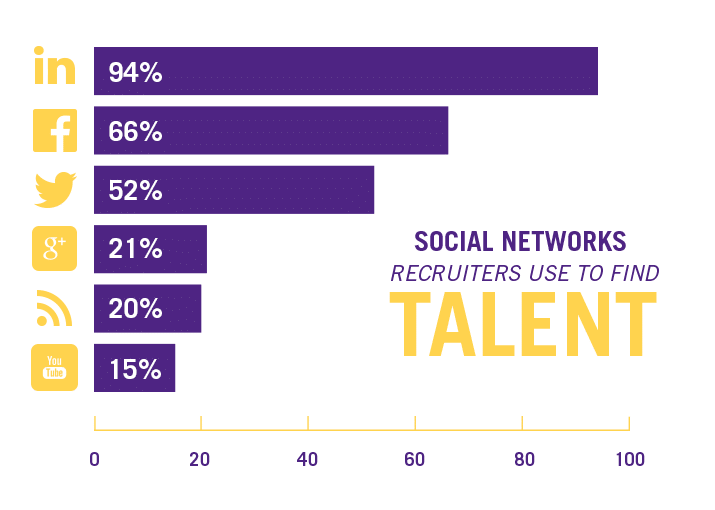According to Career Builder, 52 percent of employers now use social media networking sites as a part of the recruiting process. This figure is up 13 percent in just two years. It’s becoming clear that social media recruitment is on the rise. With so many human resources professionals using it as a tool to discover potential employees, understanding the process and how to go about it professionally is important.
Emergence Of Social Media Recruitment
The explosion of social media recruiting came as a result of the recession. With millions of Americans losing their jobs, the talent pool grew more and more competitive. [pullquote]Luckily for employers, they now had a new resource — social media — to use to their recruiting advantage.[/pullquote] By then LinkedIn was commonplace, and online job posting sites were the norm.
The practice had an effect on both candidates and businesses. Job seekers were able to use LinkedIn, Twitter and Facebook to find potential opportunities, while employers used them to ensure potential employees were qualified.
Social media also allows candidates to see the experiences of current and former employees, both positive and negative. Any bad experiences will be reflected on websites like Glassdoor and could have an impact on whether someone applies to a company. Conversely, recruiters can use these websites to understand the past of potential candidates and gain a better understanding of them.
In addition, mobile platforms have enhanced social media recruiting. With smartphones and tablets, recruiters and candidates can search anywhere and anytime. This has made it easier for candidates to find potential opportunities, but more difficult for recruiters needing to reach a more mobile audience.
Social Media Recruiting Strategies
Each social network offers different resources for recruiters to take advantage of. Some like LinkedIn have options geared toward recruiters, while others can just help present a better picture of what a candidate is like.
Across All Platforms
Before focusing on individual social networks, it’s important that you have a few basics nailed down. [pullquote]It’s imperative that your job board uses social media integration.[/pullquote] This will allow you to easily share job postings and direct potential recruits to the job board directly. You should also ensure that you have a brand identity across all platforms that properly identifies you as the recruitment arm of the company. If this identity isn’t unique from the larger umbrella, then it could confuse applicants and distract them from learning more.
You should also ensure that your social media strategy involves diverse content. Your goal across all platforms is to entice potential talent not just through job postings, but also through a conversation about the company. While looking through job information, applicants should be able to learn more about life at this company. They should learn from news, first-hand accounts and other information that this is a place they want to work.
Being a business-oriented social network, LinkedIn has a service designed just for recruiters. It allows recruiters to run detailed searches on the exact kind of candidate they’re looking for and gives access to the candidate’s entire profile. Recruiters can search by location, previous employers and job titles, education and much more. This ultimate tool for recruiting can be steep (starting at $2,220 per quarter), but it is the ideal resource for any recruiter.
LinkedIn also offers extensive job posting capabilities for businesses, and the company has recently purchased several job-seeking services. Expect LinkedIn to expand its job posting capabilities as it attempts to become a one-stop shop for business professionals.
For some companies, Twitter is a great way to recruit and reach candidates with progressive skills. Twitter allows companies to share available jobs quickly and efficiently. There are several hashtags used by job seekers to congregate opportunities including #TweetMyJobs and #JobSearch. The best part about using Twitter for recruiting is that it’s free. This makes it ideal for smaller companies unable to invest large amounts of money in recruiting software or services.
While it may not seem like the right platform for recruiting, Facebook’s massive user base makes it hard to ignore. Recruiters who use Facebook effectively can reach an audience uninterested in the rat race of LinkedIn. Because Facebook is a more personal network, it allows recruiters to appeal to a potential candidate on a different level. Furthermore, Facebook helps recruiters improve the brand of their company, especially among students not yet involved in many other social networks.
IMAGE: PEXELS
Success Stories
Some companies have become quite strong at using social media recruiting to attract candidates. These four organizations have become an example for others to follow and are leading the trend.
UPS
According to its website, UPS employs 354,000 in America alone. Ensuring that its workforce is at full employment is a big task, and UPS uses all platforms to highlight the unique value proposition for potential employees. UPS social media accounts seek out applicants from a broader audience than what traditional recruitment would bring in. UPS highlights volunteer efforts, an ambitious tuition reimbursement program and the company’s diverse employee base. The UPS accounts are an excellent example of showcasing how your company is different than other employment experiences.
Disney
Everyone associates Disney with fantasy and dreams, so it’s not surprising to see that’s a focus of its social media recruiting. The company highlights the dreamer spirit behind its history and encourages potential applicants to learn more with the idea that it is a “dream come true.” By appealing to the desires of applicants, Disney is able to play to a strength that other companies cannot. For some, working at Disney is truly an opportunity to live a dream, and its social media reflects that.
L’Oreal
The world’s largest cosmetics and beauty company has invested heavily in social media recruiting. L’Oreal spreads an inviting message across all social media channels and in several countries, including the United States, United Kingdom, and Australia. The company uses several accounts directed at various age groups, from recent college graduates to longtime professionals. On Twitter, L’Oreal created a careers account, where the company regularly posts jobs and information about its culture.
Sodexo
Among the leading providers in food and facilities management, Sodexo is able to capitalize on social media recruitment in spaces that bigger names are unable to. The company focuses on displaying employee culture as a community atmosphere. Sodexo’s employment page features a blog with content intent on convincing potential candidates to apply. The blog is a big part of the company’s Facebook career page, which engages users with contests and videos. By focusing on the concept of community, Sodexo offers potential candidates, during the recruitment process, a better understanding of what it’s like to work for the company.
Implementing Social Media Recruiting
Recruiters must use social media to attract top talent for open positions in today’s competitive job market. Learn the best recruiting practices and much more at Concordia University Texas in the online BBA with a concentration in Human Resource Management program. This affordable and fully online program can help you take the next step in your journey to become a skilled and knowledgeable human resource professional. Learn more today.
For more social media articles and information from us here at Bit Rebels, click here!




COMMENTS